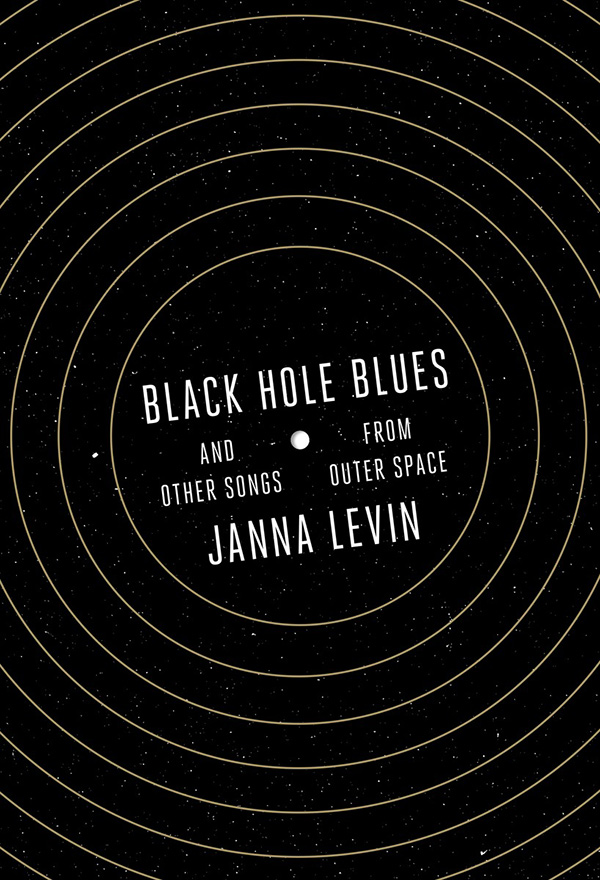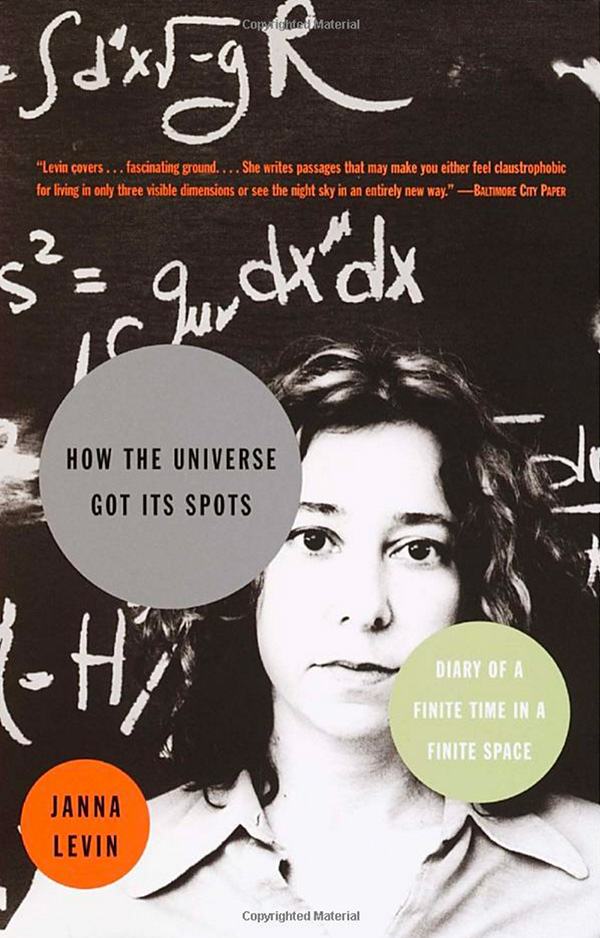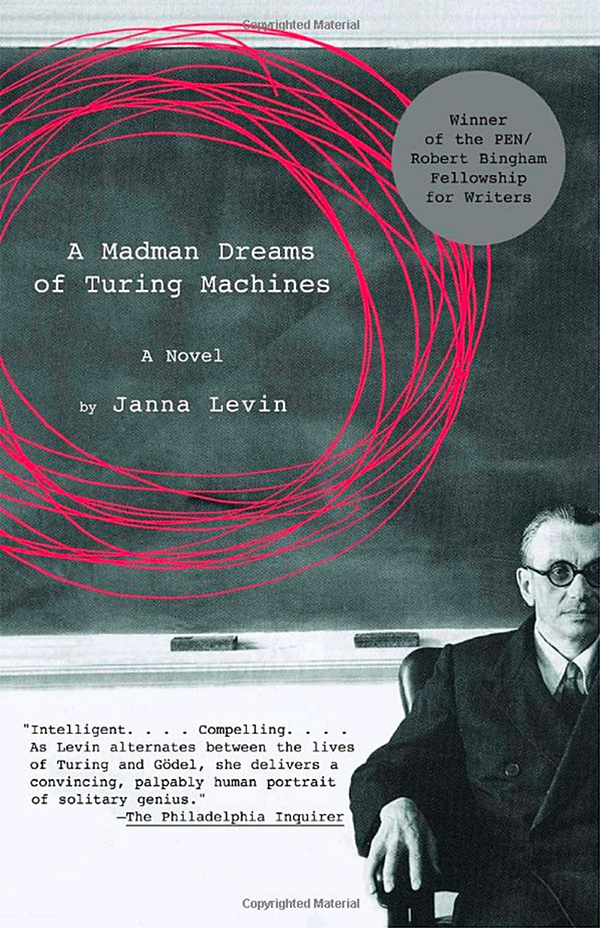From the Publisher
Knopf, 2016
“From the author of How the Universe Got Its Spots and A Madman Dreams of Turing Machines, the epic story of the scientific campaign to record the soundtrack of our universe.
Black holes are dark. That is their essence. When black holes collide, they will do so unilluminated. Yet the black hole collision is an event more powerful than any since the origin of the universe. The profusion of energy will emanate as waves in the shape of spacetime: gravitational waves. No telescope will ever record the event; instead, the only evidence would be the sound of spacetime ringing. In 1916, Einstein predicted the existence of gravitational waves, his top priority after he proposed his theory of curved spacetime. One century later, we are recording the first sounds from space, the soundtrack to accompany astronomy’s silent movie.
In Black Hole Blues and Other Songs from Outer Space, Janna Levin recounts the fascinating story of the obsessions, the aspirations, and the trials of the scientists who embarked on an arduous, fifty-year endeavor to capture these elusive waves. An experimental ambition that began as an amusing thought experiment, a mad idea, became the object of fixation for the original architects—Rai Weiss, Kip Thorne, and Ron Drever. Striving to make the ambition a reality, the original three gradually accumulated an international team of hundreds. As this book was written, two massive instruments of remarkably delicate sensitivity were brought to advanced capability. As the book draws to a close, five decades after the experimental ambition began, the team races to intercept a wisp of a sound with two colossal machines, hoping to succeed in time for the centenary of Einstein’s most radical idea. Janna Levin’s absorbing account of the surprises, disappointments, achievements, and risks in this unfolding story offers a portrait of modern science that is unlike anything we’ve seen before.”
Reviews
“Taking on the simultaneous roles of expert scientist, journalist, historian and storyteller of uncommon enchantment, Levin delivers pure signal from cover to cover….Levin profiles the key figures in this revolution with Dostoyevskian insight….She harmonizes science and life with remarkable virtuosity….But as redemptive as the story of countless trials and unlikely triumph may be, what makes the book most rewarding is Levin’s exquisite prose, which bears the mark of a first-rate writer: an acute critical mind haloed with generosity of spirit.”
—Maria Popova, The New York Times Book Review
“The astonishing story of how science was able to measure such a tiny effect, at a cost of a few hundred million dollars (which seems modest given the achievement), is told by Janna Levin in her superb “Black Hole Blues.” Ms. Levin is able to tell the tale so soon, and so well, because she has had privileged access to the experiment conducted with the Laser Interferometer Gravitational-Wave Observatory, known as LIGO….Ms Levin’s easy style…makes readers feel as if they are sitting in on her interviews or watching over her shoulder as she describes two black holes colliding. This is a splendid book that I recommend to anyone with an interest in how science works and in the power of human imagination and ability.”
—John Gribbin, The Wall Street Journal
“Levin’s authoritative account of the brilliant physicists and engineers who envisioned such a remarkable experiment places readers right in the middle of the action, tracing LIGO’s evolution from an inspired idea in the 1970s to the most expensive project in the history of the National Science Foundation. She perfectly captures the fast-paced, forward-thinking, bureaucracy-averse atmosphere of a large-scale scientific experiment, but she also lays bare the decades of interpersonal strife that, at times, threatened to undermine the experiment’s success. The author’s portrait of these pioneers is especially engaging for her ability to contextualize humanness not just within the scope of the physical experiment, but in the face of such dizzying stakes—surely a Nobel is on the line and has been since the beginning. Levin herself is also wondrously present in this narrative, nimbly guiding readers through scientific jargon and reminding us of the enormous profundity of modern physics. ‘A vestige of the noise of the [black hole] crash,’ she writes, ‘has been on its way to us since early multicelled organisms fossilized in supercontinents on a still dynamic Earth.’ A superb alignment of author and subject: Levin is among the best contemporary science writers, and LIGO is arguably the most compelling experiment on the planet.”
—Kirkus *starred review*
“Lively, poignant, engaging….a story worth telling.”
—Science Magazine
“[Levin] explains in clear terms the scientific heart of this achievement and the deep and personal fascination that pursuing it has held for several generations of scientists. She also captures the cost of getting to this point, both financial—this is big science in its truest sense—and, in many cases, personal….Illuminating.”
—Nature
“Compelling…. a fascinating book about not just the science of gravitational waves but also the very human process by which that science gets done….likely to stand the test of time.”
—The Space Review
“A miraculously beautiful book….I feel a kind of civic duty to get it into the hands, hearts, and minds of as many people as possible. This particular book is one of the finest I’ve ever read – the kind that will be read and cherished a century from now. Dr. Levin is a splendid writer of extraordinary intellectual elegance – partway between Galileo and Goethe, she fuses her scientific scrupulousness with remarkable poetic potency.”
—Brain Pickings
“Science will never seem as rock ‘n’ roll to you as it does in Janna Levin’s Black Hole Blues and Other Songs from Outer Space, a book that tells the story of the scientists who have dedicated their careers to trying to record the music of the universe…. This book recounts the decades of passion and obsession that led to the recent scientific breakthrough. And it’s really cool.”
—Bustle, “9 Nonfiction Books About Science That Anyone Can Get Into”
“A fascinatingly human narrative about the treasure hunt for evidence of gravitational waves…. Levin navigates the book’s complex science with skill, devoting sections to explaining how pulsars emit gravitational waves or why some scientists didn’t believe black holes existed until the 1990s….She writes with a smart, snappy voice that always follows one rule: she never editorializes on the facts….[which] rings true to the scientific method….Reveals the human struggle behind real world science.”
—Barnes and Noble Sci-Fi and Fantasy Blog
“Science writing at its best: a slim volume that sings that tale of discovery, charting how these scientists got to that day last autumn. Black Hole Blues is as illustrative, temperamental, and dramatic as it is poetic.”
—Signature
“Following the detection of gravitational waves 100 years after Einstein predicted their existence, Levin, a professor physics and astronomy at Barnard College, goes behind the scenes for a chatty insider’s look at the brilliant, eccentric people who continued the search for the elusive phenomenon….Levin tells the story of this grand quest with the immediacy of a thriller and makes the fixations and foibles of its participants understandable.”
—Publishers Weekly
“Not only is Levin a theoretical cosmologist but also an eloquent writer able to explain high science to laymen….Levin’s third book is not only an engaging story of a major scientific discovery but also of the universe’s many mysteries—and the ceaseless human quest to solve them. Even if you were bad or uninterested in science, don’t miss this one.”
—I4U News
“[A] quick, engaging read….This is less a story about the science of gravitational waves than a story about the doing of science, with vividly described personalities and personality conflicts. LIGO’s development had several periods that would fairly be described as “tumultuous,” and Levin goes into these in compelling detail….Fun and insightful.”
—Forbes
“What makes me excited about this is that it promises to be a practical look at how the science actually got done, which is much more accessible for the nonscientist. I’m Here For This.”
—Book Riot
“This is a beautifully written account of the quest to open the ‘gravitational-wave window’ onto our universe, and use it to explore our universe’s warped side: black holes and other phenomena made from warped spacetime. As a participant in this wonderful quest, I applaud Janna Levin for capturing so well our vision, our struggles, and the ethos and spirit of our torturous route toward success.”
—Kip Thorne, author of The Science of Interstellar
“If Hunter Thompson had taken a break to get a PhD in physics and then become obsessed with gravitational waves, he might have written a book like this. And maybe not. Janna Levin’s book is smart, hip, and resonant with the sounds of scientists at work.”
—Alan Lightman, author of The Accidental Universe
“Science meets cinéma vérité in this riveting book. Janna Levin immerses us in the heady world of scientists straining to detect gravitational waves, the faintest whispers in the universe. What emerges is a story about listening… the most sensitive, determined, obsessive listening anyone has ever tried to do. Keenly observed and lyrically written, her account of this quest will move you.”
—Steven Strogatz, Professor of Mathematics, Cornell University, and author of The Joy of x
“Janna Levin’s book is a delightful read. With humor as well as understanding, she tells the human stories inside the project to detect gravitational waves from astronomical sources. She describes the hopes and aspirations of the people who have been working for many years on the cutting edge technology to achieve the sensitivity to detect the elusive waves predicted by Albert Einstein in 1916. As a professional astrophysicist and an expert in the phenomenology of black holes, she explains well the remarkable discovery made by the project a century later.”
—Rainer Weiss, Emeritus Professor of Physics MIT
“A first-hand account of the scientific pursuit to detect gravitational waves—sounds without material medium that are generated by the collision of black holes and other exotic astrophysical events. In 1916, Albert Einstein became the first to predict the existence of gravitational waves, which were finally detected this month. In this book, Levin recounts the dramatic search over the last 50 years for these elusive waves, which are considered to be the holy grail of modern cosmology and the soundtrack of the universe. Levin is an accomplished astrophysicist and a colleague of the four scientists at the center of this book. It is a story that, until now, has been known only to those most involved with the project.”
—NPR.org
“A remarkable achievement that potentially opens up a whole new chapter in our understanding of the cosmos and, with perfect timing, Janna Levin’s elegant and lucid book is here to tell us how it was done….The human drama is compelling….The main protagonists…comprise as fascinating a triumvirate as you will find anywhere in scientific literature. Levin, a distinguished astrophysicist in her own right, writes eloquently, sometimes even poetically, about the search for what she calls gravity’s music.”
—Mail on Sunday (UK)
“This is a popular science book that is very, very well written….Levin has inverted the usual formula. Your average popsci hack plods breathlessly through the technicalities, inserting little fragments of reportage for drama and to make the story more ‘human.’ This is a terrible idea. Levin starts from the humans and the story, and lets the science emerge until, finally, the science and the human become one….Brilliant.”
—Bryan Appleyard, The Sunday Times (UK)
“It is hard to imagine that a better narrative will ever be written about the behind-the-scenes heartbreak and hardship that goes with scientific discovery. Black Hole Blues is a near-perfect balance of science, storytelling and insight. The prose is transparent and joyful….It is as inevitable as gravity that this book will win a swath of awards.”
—New Statesman (UK)


